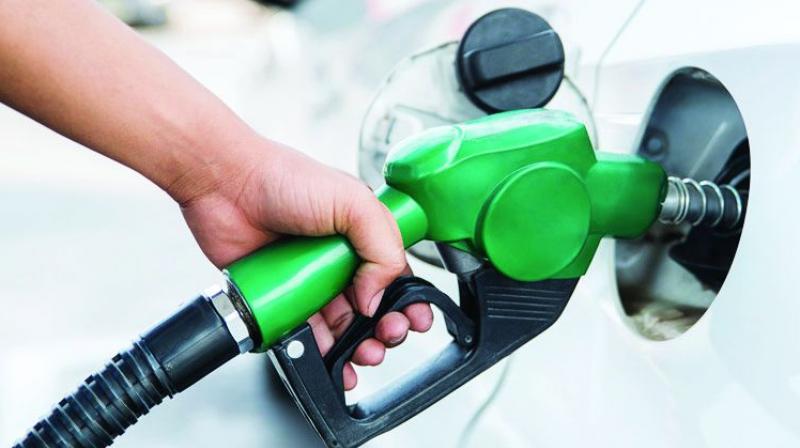Centre may cut excise duty on petrol, diesel
Government faced strong criticism for holding on to higher duty on petrol and diesel to meet revenue.

New Delhi: The government may finally come to the rescue of the common man hit hard by rising fuel prices. The finance ministry may favour an excise duty cut on petrol and diesel if global crude oil prices remained above $ 75 a barrel for more than a month in succession.
The benchmark Brent crude oil prices have remained above $75 a barrel on most days in May and is now hovering close to $ 77 a barrel. The price of Indian basket of crude comprising sour grade (Oman & Dubai average) and sweet grade (Brent dated) has also shot up to over $ 72 a barrel this month as against an average of $69.30 a barrel during April.
Officials privy to the development said the government’s stiff stance on the excise duty cut could be revisited soon if global crude prices continue to move north. "May be $75 a barrel could be the trigger point for looking at the duties if this level is maintained for over a month," an official said.
Though the quantum of is still to be worked out, sources said it could be graded with Rs 2 per litre cut on petrol and diesel to be considered at first.
The duty cut may be restored if crude and product prices fell subsequently and remained low for a longer period.
The finance ministry has maintained a tough stance on excise duty cut to rein in rising price of petrol and diesel often passing the buck to states to cut higher duties.
The Centre reduced excise duty on petrol and diesel by Rs 2 a litre on October 3 to tame rising inflation and to shield consumers from the surging price of auto fuels, the first cut after duty were raised on nine occasions between 2015 and 2016. This decision, however, came late and after the government faced strong criticism for holding on to higher duty on petrol and diesel to meet revenue
Th rising crude oil prices presents a huge threat to India that meets 83 per cent of its oil needs through imports. Apart from resulting in higher retail prices of petrol and diesel, higher oil prices increase India’s oil import bill and shoots up current account deficit and also results in higher subsidy pay outs.
“This is a good development that should certainly help both fuel consumers and public sector oil retailers. Companies like Indian Oil Corporation (IOC) have been told not to increase petrol and diesel prices since April 24 in the wake of Karnataka elections at high cost. Even though product prices needed to be increased between Rs 2and Rs 3 per litre since then due to global developments,” said an oil sector analyst asking not to be named.
“A duty cut is the only option if spike in global crude oil price and product prices results in sharp rise in price of petrol and diesel for Indian consumers. Though the retail price of two products is deregulated and decided by oil companies on a daily basis, duty cut would arrest the momentum of price rise and bring relief to consumers while also help contain inflation,” said a government official adding the states would also nudged to cut VAT.
Retail price of petrol has moved up from Rs 68.38 a litre prevailing immediately after earlier round of Rs 2 excise duty cut on October 3 to 55-month high of Rs 74.63 a litre on April 24, the date since when retail price revision has been frozen. Similarly, diesel prices during the same period has moved up from Rs 56.89 a litre to and to a record high of Rs 65.93 on April 24.
The revenue implications during last duty cut were Rs 13,000 crore during the balance period of current fiscal. But a Rs 2 a litre excise duty cut now would rob the centre of revenue to the tune of Rs 24,000 crore.
Sources in finance ministry said that inflation was their key concern and oil price movements were being constantly monitored to see prices did not shoot up beyond a point at the retail level. Higher inflation would have a bearing on interest rates.
Though murmurs for duty cut has begun now, the Centre is likely to tread carefully so that it did not sacrifice much of revenue that is already under strain after the implementation of GST.

